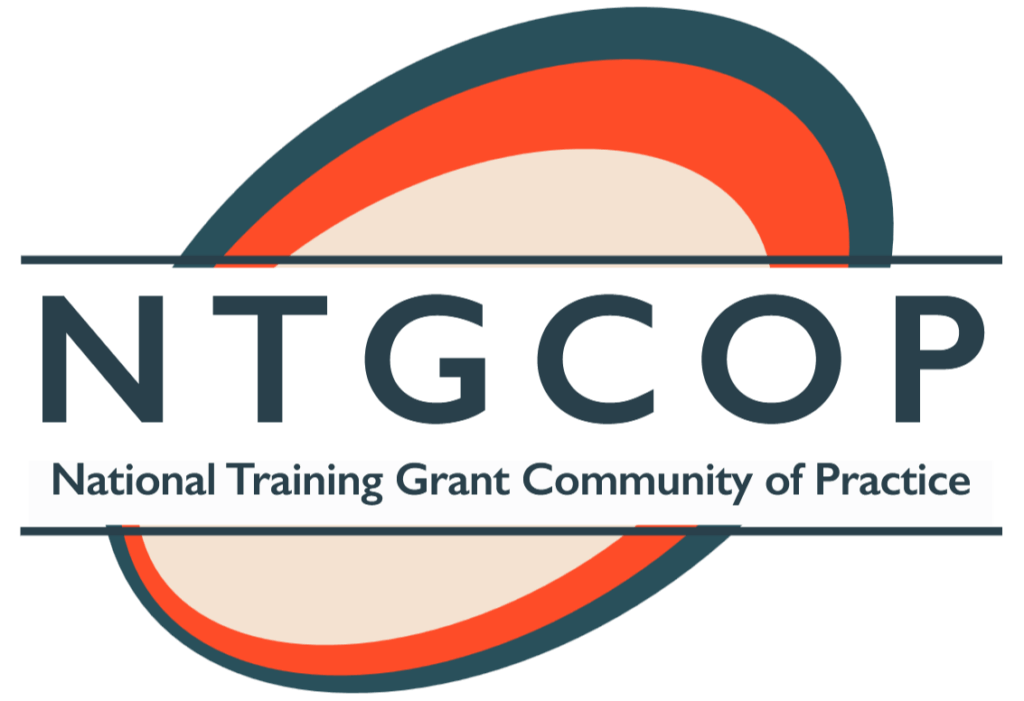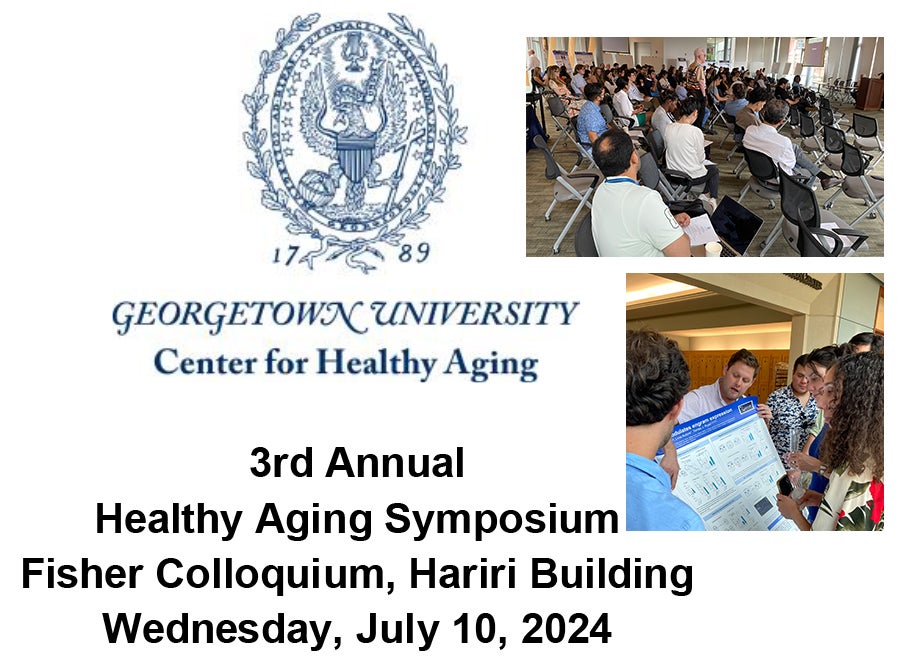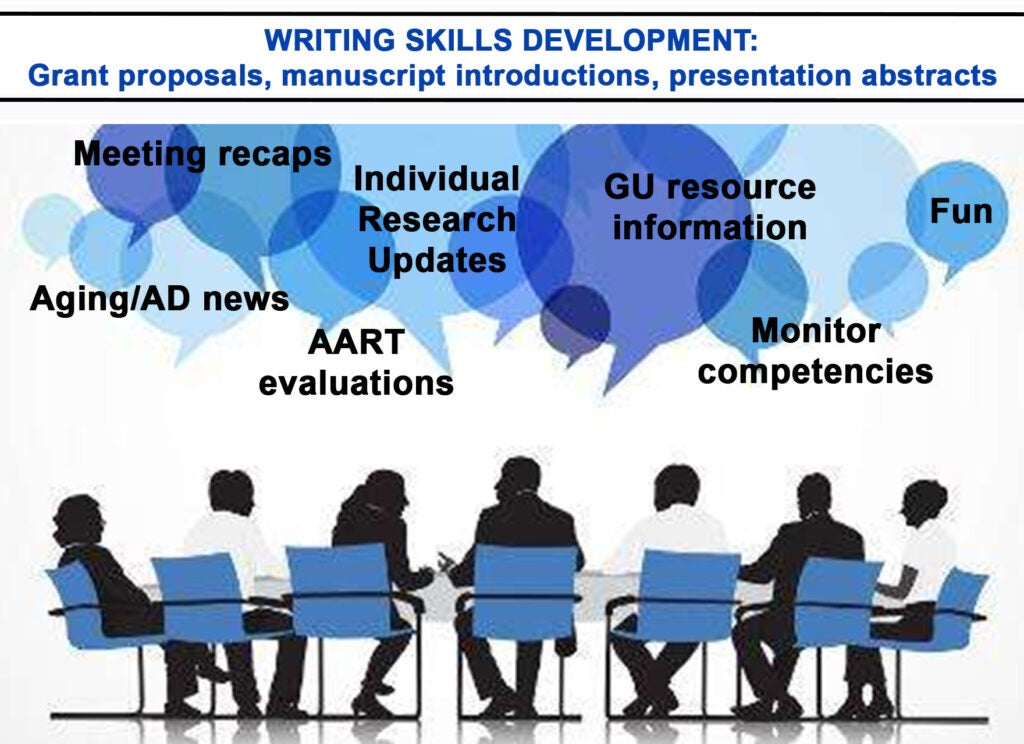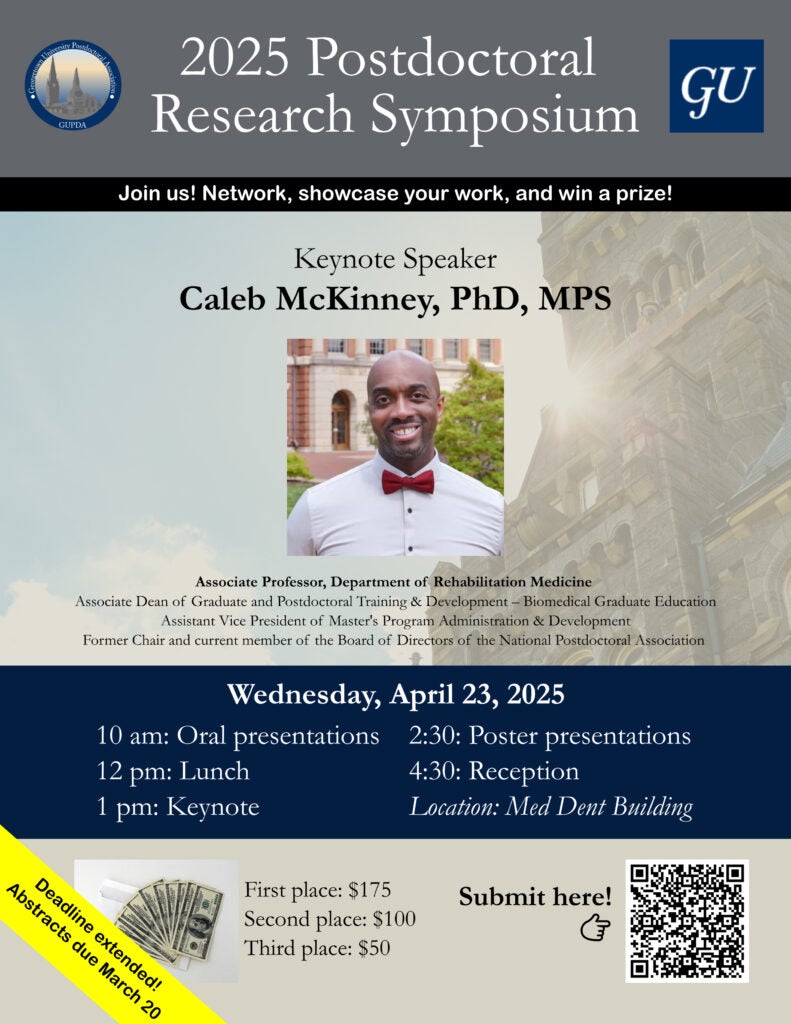Training Opportunities
Detailed descriptions of required opportunities:
1. Clinical. Georgetown University, its medical center, and its associated clinical partner (MedStar Health) occupy a contiguous campus in the Georgetown neighborhood of Washington DC. The proximity of the academic and clinical components of training provides a wide variety of research opportunities for the trainees of this AART program, including the Grand Rounds seminars, experience at the Memory Disorders Program, and brain cuttings.
Memory Disorders Program. The Georgetown Memory Disorders Program is directed by Dr. Scott Turner for the prevention and treatment of AD and related dementias. The program offers clinical care for patients and training for health care professionals and includes a very strong clinical trials program in collaboration with centers across the country. This program has a variety of research opportunities, mainly divided into 1) observational/biomarker discovery and validation studies, and 2) treatment trials. The Memory Disorders Program has been involved in the clinical trials of anti-amyloid immunotherapies, recently approved by the FDA for treatment of AD. They are also active in studies relating to their important adverse side effect, Amyloid-Related Imaging Abnormalities. Trainees will be able to initiate and contribute to tailored research projects with the Memory Disorders Program (in consultation with their research mentors). For example, one current trainee has recently published a review of mouse models of ARIA with Drs. Turner and Rebeck.
Georgetown Brain Bank. Dr. Brent Harris is a Georgetown neuropathologist who oversees the national Target ALS consortium for post-mortem tissue collection. Through the brain bank, AART students and fellows will be exposed to the use of human tissues in AD and aging research. Tissues are collected clinically and during autopsies (when permitted) and used for research into the pathological changes in specific neurodegenerative diseases. The analysis of these tissues is important for diagnoses for patients and families. Macroscopic and microscopic examinations are presented about every two weeks for training of medical students, graduate students, and fellows, promoting a better understanding of the connections between pathological changes and clinical demonstrations. These materials are also available for trainees’ research projects (as well as materials available through national ADRC neuropathology cores, as part of their commitment to the research community).
Georgetown-Howard Universities Center for Clinical and Translational Science. The GHUCCTS encourages partnerships and collaborations among organizations (academic, government and industry) in the Washington DC area. Through these partnerships, GHUCCTS facilitates the adoption of new scientific advances into improvements in health care, using evidence-based approaches. As part of their initial introduction in the AART, trainees and mentors will be informed about the resources available to them in terms of research opportunities. The training portion of GHUCCTS has other funding opportunities that are available to AART trainees whose research is translational in nature, including the KL2 mechanism for post-doctoral fellows.
2. Coursework. AART PhD students are required to take Molecular Mechanisms of Neurodegeneration, but there are also a number of courses that trainees can benefit from, including several that would prepare trainees for policy-related work (a viable career in the Washington DC area). Topics covered in each course from their syllabi are summarized here.
- Molecular Mechanisms of Neurodegeneration (required): Normal aging, Neuronal Cell Death mechanisms, Proteolysis, Neuroinflammation, Parkinson’s Disease, Lewy Body Dementia, Cellular Senescence, Alzheimer’s Disease, Chronic Traumatic Encephalopathy, Prion diseases, Amyotrophic Lateral Sclerosis, Macular Degeneration, Huntington’s Disease, Neuro-oncology, Personalized Medicine, and Drug Discovery.
- Cognitive Neuroscience & Aging: Aging effects in each of these systems: Sensation and Perception, Motor Functions, Memory and Executive Function, Language, Personality, Emotions, Social Cognition, Cognitive Reserve; as well as genetics, environmental factors, and neuroethics.
- Principles of Neuroimmunology: Cytokines & Chemokines, Innate Immunity, Adaptive Immunity, Blood Brain Barrier, Glymphatics, Meningeal Neuroimmune interface, Meningeal Immunity in Neurological Disease, Selected Topics of Disease.
- Neuroscience Shaping Society: Translating Neuroscience to Policy and Society, Health and Biomedical Research Policy, Neuroscience and Public Engagement, Science Policy, NIH SfN and BRAIN initiatives, Neuroscience and Environment, Legislative Process,
- Science and Technology in the Global Arena: (Biomedical Science Policy & Advocacy Concentration): The course uses examples drawn from environment, security, nuclear policy, information, communications, energy, homeland defense, health, and manufacturing technology, and explores issues of sustainability, scientific risk and uncertainty, the links of science and technology with economics and geopolitics, scientific advice to governments, and government support to research and innovation.
- Translational Neuroscience: Chemotherapy, Traumatic Brain Injury and Inflammation, HIV, Pain, Parkinson’s Disease, Sleep, Neoplasms, Seizure Disorders, Alzheimer’s Disease, Emerging Infections, Stroke, Cerebral Malaria.
For trainees interested in exploring academic teaching as a potential career, there is the option of presenting lectures on specific topics in some of these graduate courses. Specifically, predoctoral students could teach classes related to AD or aging-related diseases in the course, Topics in Neuroscience: Diseases, Research, and Treatment. Postdoctoral fellows could teach in the higher-level graduate level courses, Experimental Approaches & Techniques, Translational Neuroscience, or Molecular Mechanisms of Neurodegeneration. These classes could draw on the diverse areas of expertise that the postdoctoral fellows brought with them to Georgetown. As for all new teachers, faculty will provide constructive advice and feedback to the fellows and students about best teaching practices, including information about organization, slides, syllabi, and grading. Feedback occurs before the based on the materials that will be presented (e.g., PowerPoint slides) and after the actual classroom teaching. The University has a very strong resource for undergraduate and graduate pedagogy training in the Center for New Designs in Learning and Scholarship.
3. Biostatistics requirement. The continued need for rigor in experimental design, statistical methodology, and quantitative analyses has never been stronger in scientific research. We are working with a program developed by the Center for Neural Injury and Recovery, who have developed workshops facilitated by Dr. Ming Tan, Chair of Biostatistics, Bioinformatics and Biomathematics at Georgetown University. These workshops build on training in biostatistics that all trainees have had before joining the AART program. However, it is well-recognized that statistical fluency requires constant attention. Furthermore, this training includes newer statistical approaches that incorporate machine learning and high dimensional “-omics” and imaging data. There are four different workshops over the year that accomplishes this training:
- “Understanding little ‘p’ and quantitative approaches.” This workshop moves beyond significant p value threshold of 0.05, having trainees reflect how ‘p’ values are used and the usefulness of equally stressing effect sizes. This workshop uses primary published studies to examine the strengths and weaknesses of a given study.
- “Experimental Design and Reproducibility.” Trainees discuss the many factors that contribute to achieving reproducible findings. Topics include are (direct replication, analytic replication, systemic replication and conceptual replication); inappropriate study design, lack of access to methodological details, raw data and even research materials, use of cross-contaminated or over-passaged cell lines, non-publication of negative results, and cognitive bias.
- “Applying rigorous study design to your research.” Dr. Tan facilitates the discussions (and critiques) of trainee-mentor pairs concerning their own experimental design. Best practices in statistical methodology are introduced by Dr. Tan and individualized for the trainee-mentor pairs. Areas covered include: understanding the fundamental concepts of statistics inference and probability theory: probability distribution, statistical significance, hypothesis testing and regression; Bayesian thinking; statistical issues in high dimensional and imaging data.
- “Statistical methodology & your research.” Dr. Tan leads this working session to apply statistical methods discussed to the experiment discussed and designed in Workshop 3. This approach expands the biostatistical training beyond the trainees to their labs and establishes relationships with biostatistics faculty for continued specialized input, tailored to each individual project.
4. AD Research Center seminar series. Trainees attend monthly zoom seminars organized by the Johns Hopkins ADRC (Figure 3). These talks expose the trainees not only to the science of the ADRC system, but also to the collaborative environment seen in Alzheimer’s disease research. Trainees also learn about available resources at ADRC, such as clinical databases, brain banks, and ADNI data. Through these interactions, trainees also learn about the difficulties and promise of creating systems for sharing of data and resources.

Many seminar series on the Georgetown campus (Neuroscience, Biochemistry, Psychology, Neurology, Pharmacology) may also be important to the training of the AART students and fellows. Several existing seminar series regularly host researchers working on aging-related neurodegeneration; these series are completely supported by university funds. In particular, the Georgetown University Neuroscience Seminar Series is an important source of new information into AD and related disorders, usually from a basic science perspective. A more clinical perspective is found in the Neurosciences Grand Rounds at MedStar Georgetown University Hospital.
5. Grant writing. All mentors of students and postdoctoral fellows are required to work with their trainees on the submission of grant proposals to the NIH as part of their duties in the AART training program. These proposals differ by the career stage of the trainees: F mechanisms for predoctoral students; K mechanisms for postdoctoral fellows (K01, K08) and R mechanisms for advanced fellows (K99/R01, R03, R21, R01). Previous successful submissions from individuals in core faculty labs are distributed to students and fellows for examples of grant forms and structures.

Each year, all second-year trainees are required to submit a draft of a proposal to the AART program for discussion at one of the roundtables (no more than one discussion per Roundtable). All proposals will be reviewed with several questions in mind: What is important about the work? Why is now the time for it? Why is the trainee the one to do it? What are possible outcomes and how will they be interpreted? Proposals will also be reviewed with statistical principles in mind. It is the trainee’s choice about whether they want input early in the writing process or at a time closer to submission. Feedback comes from everyone at the Roundtable: the faculty facilitator and all of the other trainees. Successful awards will immediately help trainees by demonstrating on their CV’s their knowledge of the importance of applying for funding and their ability to complete the process.
6. Meetings. The support of the AART allows students to more easily attend meetings for training and for research. Week-long training courses at Cold Spring Harbor or Wood’s Hole are excellent opportunities. For scientific meetings, trainees travel nationally for both large and small meetings. For any presentations, AART acts as a place to present draft posters or practice oral presentations. Washington DC is a great place for easily attending some meetings relevant to AART: the Society for Neuroscience holds its annual meeting here every three years (including in 2026); and the NIH often has relevant meetings that include scientists and community members; this year there was a summit on Alzheimer’s Disease and Related Dementias in April. Summaries of particularly interesting findings are brought forward at Roundtable discussions.
Competencies: trainees will be able to summarize and integrate new research findings and identify trends that could impact research across labs of all the AART trainees and their mentors.
7. Weekly Journal Club. All trainees are required to attend a weekly journal club, one that is most relevant to their research progress. Journal clubs are an important way for trainees to maintain current in their fields, and we have encouraged them to attend a journal club most relevant for their research. Current journal clubs attended by trainees are: Neural Injury and Recovery; Methods Lab (for neuroimaging); Exercise/Lesion. Two of these journal clubs were begun in part by AART trainees. Mentors come to the journal clubs but are encouraged to let students and post-doctoral fellows to take the lead in asking questions and leading discussions. Mentors’ presence is particularly useful in highlighting statistical principles when they are followed (or not) in the papers being discussed.

8. Summer symposium. Students and fellows present their research at the yearly Healthy Aging Symposium (Figure 4). This symposium began due to the establishment of AART and is funded by the University commitment to the training grant. The symposium includes internal and external presenters from the larger Georgetown and Washington DC communities. One aim is to promote research collaborations among participating labs.
More details are presented in the Progress Report section of this application, but briefly, the Symposium lasts from 10:00 am to 4:00 pm one day in July. It is advertised widely, including calls for abstracts from the broad research community (including presentations from many schools at Georgetown: Georgetown College, School of Health, School of Nursing, Medical Center, Public Policy, Law). So far, each meeting has changed somewhat in its organization, but it now includes a plenary speaker, several panels discussing research topics from different perspectives (biomedical, social, community-based), and break-out sessions of 45 minutes for more engaged discussions from attendees. There are posters throughout the meeting, with designated times for presenting and discussing them. There is food during the meeting to encourage participants to remain, particularly when the upcoming topics may be more tangential to their research focus. Registration is simple and can occur the day of the meeting. The meeting is held at excellent facilities at the Georgetown School of Business in the middle of the Main and Medical campuses.
All AART trainees submit abstracts; the abstracts are shared with the group at a Roundtable discussion of how to accurately present the most exciting aspects of one’s work. At the meeting, all AART trainees’ posters are visited by AART faculty and trainees receive immediate feedback about how to present their work succinctly, how to stress the justification for the research, how to explain data images (and not just conclusions), and how to convey skepticism of their own work. In each of these poster presentations, AART trainees include explicit standards of issues of rigor and reproducibility based on a template provided (e.g., power analyses, statistical tests, model verification, age and sex as important variables, experimental repeat types and numbers, blinded analyses, etc.). This event has provided good visibility for AART and has generated cohesiveness across AART trainees, mentors, and labs. After each meeting, there is a survey for feedback, which has been used each year for improvements.
9. Data curation. Good data curation is a necessity for individual research projects and more broadly throughout the sciences. The FAIR data principles are Findable, Accessible, Interoperable, and Reusable. FAIR data is increasingly necessary in interactions with the federal government regulations and journal publication requirements. These workshops examine the concepts behind FAIR data principles, how to harmonize data so that it can be shared globally, statistical concepts for unsmoothed/incomplete merged datasets, and the power of these approaches in unearthing patterns in studies across disciplines in aging. Workshops are delivered by Dr. Adam Ferguson (Associate Professor, UCSF) and Dr. Mark Burns (Georgetown Center for Neural Injury and Recovery). AART trainees (and their mentors) attend the following four yearly workshops:
- “Introducing FAIR data principles.” The basic ideas of data management are introduced. Trainees are separated into teams to debate the pros and cons of FAIR data principles.
- “Data repositories.” Trainees access publicly available datasets in their fields of interest and begin to learn how to interrogate them.
- “Data curation, mapping and harmonization.” The trainees are exposed to the ideas of common data elements and data dictionaries, as well as why it is difficult to harmonize data. When possible, trainees use their own data to create a dataset ready for upload to a repository.
- “The power of big datasets.” More and more research depends on large, existing datasets. Trainees and mentors learn how to apply statistical methods to analyze large datasets, including approaches to overcome common obstacles such as missing data. The workshop demonstrates the power of multivariate pattern detection techniques and principal component analysis to extract unbiased results from compiled data.

10. Roundtable meetings of cohesion of AART community and discernment of trainees’ experience of aging research. AART trainees and the program director have roundtable meetings three to four times per semester (Figure 5). The first part of each meeting is dedicated to writing skills. For each meeting, one of the second-year trainees will bring in an Introduction for a research manuscript – either one that they are currently writing or one that they anticipate writing. The manuscript must have the appropriate references (for some students, reference management is a skill that needs to be developed). In addition, for the last meeting in the Spring, time is also spent on discussion of the abstracts to be submitted to the summer Healthy Aging Symposium. In general, the first half of a Roundtable meeting is dedicated to writing.
The second half of the Roundtable generally revolves around issues relevant to research in aging and AD. This past semester, one discussion was about a New York Times op-ed by Charles Pillar about fraud in AD research “The devastating Legacy of Lies in Alzheimer’s Science”; the group delved into the science, the evidence, and the impact of the fraud. The other discussion was about on “A Blueprint for NIH Reform” by Martin Kulldorf. This session began with consideration of what the trainees agreed about in terms of shortcomings in the current workings of federal funding of laboratory research, continued with a discussion of the proposed ways to address problems, and then considered critiques of some of the ideas and reasoning presented. It was lively and engaging.
These discussions have been useful in trainees learning about resources and ideas among their research labs that help in furthering individual research programs (e.g., microscope capabilities, help with establishing mouse behavior assays, in vitro tissue development, etc.). They have also been useful in generating ideas about how to better accomplish the goals of the AART program.
Career Development

Georgetown University has extensive institutional resources for career development programs in student and fellow training, through the office of Career Strategy and Professional Development (CPSD). These efforts are led by Caleb McKinney, PhD (Microbiology, Cornell University). Dr. McKinney is the Associate Dean of Graduate and Postdoctoral Training & Development for BGE at Georgetown University. He is the former chair and current member of the Board of Directors of the National Postdoctoral Association. This experience is particularly important in the changing landscape of scientific career opportunities, as students and fellows are uncertain about university commitments to more training and early career development.
Within CSPD, Elizabeth Salm, PhD (Neuroscience, Yale University), works within CSPD as a career advisor. Dr. Salm is the Director of Graduate and Postdoctoral Training & Development. She directs the CPSD, including programming around career and personal development for graduate students and postdoctoral fellows. She also meets with students and postdocs for one-on-one advising on career exploration and planning, the job search, and interview preparation. In her role directing the Office of Graduate and Postdoctoral Training & Development, she assists administratively with current and future federal training grants at BGE, such as this application.
In addition, Dr. Salm is one of the cofounders of the National Training Grant Community of Practice (https://ntgcop.org) (Figure 6). The goal of this organization is to bring together training grant professionals across the country to discuss best practices, develop resources, build a community, and influence NIH policy related to training grants.
There are many resources at Georgetown to help students and fellows identify their future careers and pursue the skills necessary for them:
- EPIC Career Strategy Course: A self-paced online course for career search resources and guidance.
- Academy for Transferrable Management Skills: A self-paced online course on using project management in research.
- Individual Development Plans: Structured roadmaps for personal and professional goals.
- Career Advising: Practicing interviews, exploring career options, or reviewing application materials.
- Professional Memberships: Partnering of BGE with professional organizations to provide memberships including the Maryland Tech Council and the National Postdoctoral Association.
- Transferable Skills Worksheet: Identification and organizing of professional skills from academic experiences.
- Mentor Alignment Assessment: Elucidation and evaluation of the fit with potential or current mentors, a component in addressing conflicts with AART mentors.
- Digital Training Platform: Search strategies and resources through the Beyond the Professoriate platform.
- Career Opportunities: Browse job openings and online job boards curated by CPSD.
Trainees are informed about these resources through AART, which they can easily review through websites.
For PhD students: https://biomedicalprograms.georgetown.edu/career/phd-students/
For post-doctoral fellows: https://biomedicalprograms.georgetown.edu/postdocs/
In addition, AART informs trainees about other resources; for example, recently (May 6, 2025), this included the NIA webinar, “Research Continuity and Retention and Re-Entry, Re-integration, and Re-training Supplements” about transitions through major life changes.
While pro-doctoral students have oversight from their individual Georgetown PhD programs, post-doctoral fellows can have fewer instances of peer interactions. Georgetown has a Post-Doctoral Association (PDA) with monthly meetings and happy hours to create community where fellows can share experiences and knowledge. For example, the PDA holds a yearly Research Symposium. Fellows are informed about these resources as they are hired but can also find the information at https://sites.google.com/georgetown.edu/georgetownpda/home.
